By James Oliphant
COUNCIL BLUFFS, Iowa (Reuters) – For Florida Governor Ron DeSantis, campaigning for president in Iowa meant coming to a place like the Grass Wagon, a no-frills, dimly lit reception hall where about 300 people on Wednesday awaited him, more curious voters than ardent supporters.
DeSantis was on the second day of his first swing through Iowa as a 2024 presidential candidate, and the modest surroundings and relatively small crowd – the venue was about one-third filled – was a reminder of the work that lies ahead if he hopes to wrest the Republican nomination from Donald Trump.
Earlier, DeSantis and his wife, Casey DeSantis, hosted an event at a welding company in Sioux City, in Iowa’s extreme west. Now they were downriver in Council Bluffs, a city of about 60,000, and had two more events ahead before flying to New Hampshire and South Carolina for the remainder of a three-state, 12-city tour.
The events were the kind of small-scale, meet-and-greet affairs that loom as a test for DeSantis, 44, more known for his low-key, often-taciturn demeanor and preference for policy discussions.
But that kind of shoulder-rubbing campaigning is a must in Iowa for candidates who hope to win the state’s caucuses next year, the first Republican nominating contest of the 2024 election, particularly if they, like DeSantis, lack Trump’s celebrity. Iowa voters are well known for demanding to see candidates up close.
With Trump the favorite for the nomination, a win in Iowa for DeSantis would shake up the dynamics of the race and perhaps convince some voters to give him another look. That means he will need to stump in places like Council Bluffs again and again before February.
Matt Windschitl, a state representative from the area and a DeSantis supporter, believes the governor will put in the work.
“This is grassroots politics 101,” Windschitl said in the back of the hall as DeSantis delivered his remarks. ”He’s doing all the right things right now that he needs to.”
DeSantis had ditched the suitcoat and slacks he wore at his kickoff event the evening before in Des Moines in favor of jeans and a fleece vest. But his remarks were largely similar to those delivered in other speeches, and he stood behind a lectern at some remove from the audience.
In his second week as a presidential candidate, DeSantis was still striving to fuse his standard speech about his accomplishments in Florida with an outline of how he would govern as president and as a person.
The result was an address that sometimes appeared to be trying to do too much. He spoke for about an hour even as 90-degree weather began to bake the room and some attendees fanned themselves to keep cool.
One key addition was a story about his youngest child’s baptism and an anecdote about securing baptismal water from Israel’s Sea of Galilee, perhaps a nod to the evangelical Christian voters who wield considerable influence in the Iowa caucuses. A reference to a recently passed near-total ban on abortion in Florida drew cheers.
As he has before, DeSantis painted a picture of a nation at an “inflection point,” citing inflation concerns, the porous U.S. southern border, crime, and the advent of what he terms “woke ideology.” He spoke of the need for a strong and “energetic” chief executive in the White House.
“We need to restore sanity to this society,” he said. “We can’t have every institution in American life going on some kind of ideological joy ride,” he added.
DeSantis, who holds a bachelor’s degree from Yale University as well as a degree from Harvard Law School, also spoke of growing up in working-class family, working minimum-wage jobs and joining the U.S. Navy instead of landing a lucrative job. He said he and his wife were “regular people.”
DeSantis brought Casey to the stage. Earlier in the day, she participated in a “fireside chat” with her husband in Sioux City, seated in matching armchairs in front of a John Deere tractor.
Casey DeSantis is considered to be her husband’s closest adviser. In her remarks, she showed herself as a fierce advocate for DeSantis’ Florida record while reminding listeners that the two are parents of three young children.
She mixed in stories of her kids’ wreaking havoc within the governor’s residence back home with a spirited defense of DeSantis’ COVID-era policies, when he resisted the federal government’s push for lockdowns, masks and vaccines.
“He held the line in defense of the rights and the liberties of the people in his state,” she said to loud applause.
As the event drew to a close, both waded into the crowd to pose for pictures and sign memorabilia. At times, DeSantis was deep within the scrum, surrounded by voters, well-wishers and TV cameras.
“I thought his speech was very personal. It was clearly not just canned,” said Doug Krasne, 70, of Council Bluffs, who said he had voted for Trump twice but was now looking for another Republican to support.
“My mind will stay open,” he said. “But I was very impressed with what I saw today.”
(Reporting by James Oliphant in Iowa; Editing by Leslie Adler)





